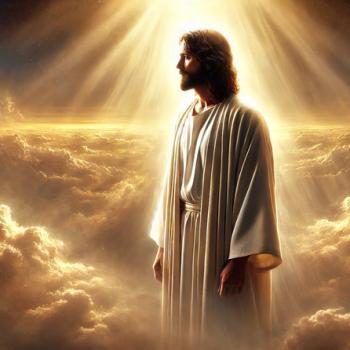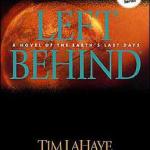Tribulation Force, pp. 393-396
“Jesus Christ is the Messiah!” the rabbi concluded.
This declaration surprises almost everyone in the story and absolutely no one reading it. It’s another clumsy anticlimax, a conclusion so thuddingly obvious for so many pages before it arrives that the authors’ efforts to make it suspenseful just make everyone in the story seem frustratingly dim.
The division of labor between the co-authors here follows the main pattern: Tim LaHaye provides the bizarre check list of ingredients and Jerry Jenkins tries and fails to turn it into a convincing narrative. Given the strangeness and difficulty of his task, I have some sympathy for Jenkins in sections like this one. I’m not sure that even a talented writer who actually cared about craft could have done much to make LaHaye’s rabbinic theories readable. But Jenkins seems to make that unenviable task even more difficult by trying to make Rabbi Tsion Ben-Judah’s conclusion both inexorable and surprising — two effects that cancel each other out here.
All of that would have sufficed to make this section of Tribulation Force unbearable, but it’s all overshadowed by the insulting ignorance of this supposed rabbi’s supposed scholarship, which makes a mockery of both Judaism and Christianity.
Imagine that a Christian scholar had been commissioned to conduct a three-year study on, let’s say, the essence of Jesus’ gospel in the New Testament.
Imagine then that this scholar appears before his fellow Christians to reveal his findings and begins by explaining that he had spent the first full year of his research examining the work of a Mormon scholar. And then as he introduces the various components of his findings, they turn out to all be based on the Book of Mormon without any reference to the New Testament except as it is viewed through the lens of that later book.
Imagine how that presentation would be received by Roman Catholic or Protestant or Orthodox audiences. Imagine how it would be received by those who hired him.
That, more or less, seems to be how Ben-Judah’s aggressively un-Jewish broadcast would go over with his Jewish audience and with the Israeli government that paid him.
Consider, for example, what he regards as the crowning touch to his argument that Jesus is the Messiah — a piece of numerology taken from the book of Daniel:
“According to the greatest of all Hebrew prophets, Daniel, there would be exactly 483 years between the decree to rebuild the wall and the city of Jerusalem ‘in troublesome times’ before the Messiah would be cut off for the sins of the people.”
That is Tim LaHaye’s/Ben-Judah’s notion of a “literal” interpretation of these verses from Daniel 9:
Know therefore and understand: from the time that the word went out to restore and rebuild Jerusalem until the time of an anointed prince, there shall be seven weeks; and for sixty-two weeks it shall be built again with streets and moat, but in a troubled time. After the sixty-two weeks, an anointed one shall be cut off and shall have nothing, and the troops of the prince who is to come shall destroy the city and the sanctuary. Its end shall come with a flood, and to the end there shall be war. Desolations are decreed. He shall make a strong covenant with many for one week, and for half of the week he shall make sacrifice and offering cease; and in their place shall be an abomination that desolates, until the decreed end is poured out upon the desolator.
And to LaHaye/Ben-Judah, that obviously and unambiguously indicates a period of precisely 483 years beginning with “the decree to rebuild” — just one specific such decree — and the sacrificial death of the Messiah. So all one needs to do, Ben-Judah says, is a bit of arithmetic:
Ben-Judah looked directly into the camera. “Exactly 483 years after the rebuilding of Jerusalem and its walls, Jesus Christ of Nazareth offered himself offered himself to the nation of Israel. …”
Look past the White-Rabbit hermeneutics of Ben-Judah’s numerology — which is about as reliable as that of Harold Camping. And look past his mangling of Jerusalem’s history. And look past even his sectarian use of the Christian phrase “Jesus Christ” and the vaguely Luther-esque notions of Jews as Christ-killers lurking at the edges of Ben-Judah’s little rant here.
I still haven’t managed to think clearly about those appalling aspects of this speech because I’m still hung up on that first phrase: “According to the greatest of all Hebrew prophets, Daniel …” Because that’s just … no.
Daniel is not the “greatest of all Hebrew prophets.” He isn’t even counted among the Hebrew prophets. In the Hebrew scriptures, the book of Daniel is included among the Ketuvim, or the “writings” — not among the books of the prophets. Daniel is regarded as a holy and righteous man and a seer, but not as a prophet. The later Christians reordered the books of the Hebrew scriptures to list Daniel among the prophets, but that’s how we Christians regard Daniel, not how he is regarded in Judaism.
So here again we see that Ben-Judah’s research is not, as he claims, based on the Hebrew scriptures, but mainly on the Christian New Testament and, to a lesser extent, on the Christian “Old Testament” as reinterpreted through the lens of that New Testament. Ben-Judah is dishonestly claiming to have done what he was commissioned to do — to begin with the Hebrew scriptures and to base is conclusions on what he found there. But he did not do that and it’s foolish for him to think that it isn’t obvious to his Jewish listeners that he didn’t do that.
He might have tried to make a case for his reinterpretation of the Hebrew scriptures. He might have said, “I have come to believe that Daniel ought to be regarded as a prophet, and not just as a prophet, but as the greatest of all our prophets. And let me explain to you why I have decided this …” But instead he just states an assertion that his audience will recognize as simply incorrect.
Not just incorrect, but foreign — Christian rather than Jewish. They will hear him as saying what he is constantly saying implicitly throughout this broadcast: “If we read the Christian Bible rather than our own scriptures, and if we read it with Christian eyes rather than with Jewish eyes, then we will come to Christian conclusions.”
That’s formally true, but like all such circular arguments it’s also irrelevant and wholly unpersuasive. And since he refuses to admit honestly that this is what he is really saying, his listeners won’t find him merely unpersuasive, they’ll find him duplicitous.
“Let me close by saying that the three years I have invested in searching the sacred writings of Moses and the prophets have been among the most rewarding of my life,” the rabbi says. Another statement sure to puzzle his listeners. The man has been a rabbi and a scholar for decades but he’s only spent three years of that time studying Moses and the prophets? What on earth was he up to for all those years before that? Who hired this clown?
“… among the most rewarding of my life. I expanded my study to books of history and other sacred writings, including the New Testament of the Gentiles, combing every record I could find to see if anyone has ever lived up to the messianic qualifications. Was there one born in Bethlehem of a virgin, a descendant of King David, traced back to our father Abraham, who was taken to Egypt, called back to minister in Galilee, preceded by a forerunner, rejected by God’s own people, betrayed for 30 pieces of silver, pierced without breaking a bone, buried with the rich, and resurrected?”
(If you’re following along in Tribulation Force, you may have noticed that I’m working backwards through this section. When a passage is as anticlimactic as this one, that seems to make more sense than trying to read it forwards.)
This follows several pages in which LaHaye & Jenkins have Ben-Judah click through a list of supposed citations supposedly prophesying all of these “qualifications.” Some of these are accurate representations of the Christian interpretations of some passages, others seem to be LaHaye’s own idiosyncratic ideas, but we don’t need to go through them all one by one to see that Ben-Judah is again just saying that a Christian interpretation of the Christian Bible leads to Christian ideas.
As he compiles this sectarian list, it seems impossible that anyone watching the broadcast wouldn’t know several pages ahead of that “conclusion” I quoted at the top that this is where the former rabbi is headed.
Bethlehem, virgin birth, Galilee, 30 pieces of silver, resurrected — it’s simply inconceivable that anyone in the Western world wouldn’t know exactly who he is talking about. But the authors portray everyone watching as though they have no idea what the rabbi might say next.
I’m picturing a “Wheel of Fortune” game, the board reading: JES_S CHRIST.
“Would you like to solve the puzzle?” Pat Sajak asks.
“I’d like to buy a vowel,” says Buck Williams. “Is there an ‘O’?”
Nicolae tries to buy an “A.” Steve Plank guesses “5.” Then Chaim Rosenzweig tells Pat he’d like to solve the puzzle. “Nicolae Carpathia!” he shouts excitedly …
I kind of glossed over the treatment of Chaim in this section because it was unpleasant and cartoonish. Despite being portrayed throughout the series up until now as a secular scientist, L&J depict him as being more excited than anyone else over this broadcast, hoping that Ben-Judah will announce that Nicolae is the Messiah. They show him toadying obsequiously and literally slapping Nicolae on the back when Ben-Judah raises — then arbitrarily dismisses — the idea of the Messiah as one “who will right wrongs, bring justice, and promise peace.”
Then when the rabbi gets to the bit about Bethlehem, we read this:
Chaim Rosenzweig was moving nervously, the only one on the plane not perfectly still. Rayford felt the old man had made a fool of himself and hoped he wouldn’t compound it. But he did. “Nicolae,” he said. “You were born in Bethlehem and moved to Cluj, right? Ha, ha!”
Chaim Rosenzweig, you see, is a Jewish scientist, and for those two reasons the authors believe he must be portrayed as a complete fool.
“He is going to claim to be the Messiah himself!” Carpathia shouted. “He was probably born in Bethlehem, and who knows what his bloodline is …”
There’s an arch-villainous logic to Nicolae’s suspicion here. It’s the old bit about the arch-villain being unable to foresee the hero’s actions because he’s expecting everyone else to do what he would do in their position.
But it doesn’t really make sense for Nicolae because he isn’t your run-of-the-mill arch-villain. He’s also the Antichrist. Tricking the world into believing that he is the Messiah is his job. That ought to mean that he’s far more of an expert on messianic expectations and prophecies than anyone could ever hope to become from a mere three years of study. The demons and devils and the generations of human secret societies who have sworn allegiance to them really ought to have done a better job preparing Nicolae’s messianic pedigree. (Those secret societies of Satan-worshippers haven’t appeared in this series of books, but this is an Antichrist story, after all, so I can’t help but picture Ruth Gordon lurking about somewhere in the shadows.) The counterfeit Christ should have been quick to recognize a description of the genuine article — even a description as quirky and selective as Ben-Judah’s.
Rayford is the only character allowed to show any sign of familiarity with the story of Christmas. A few pages before Ben-Judah finally states what he’s been hinting at — and a few pages long after even the dimmest reader had already figured it out — Rayford thinks to himself that he can see where Ben-Judah is headed. “It should be obvious to more than Carpathia by now,” he thinks.
And it should be. But the authors, as usual, don’t write things as they should be. So instead we get this torturous chapter of unsuspense and anticlimax in which the rabbi explains that the Christian scriptures, as read by Christians, teach about Christ.
















